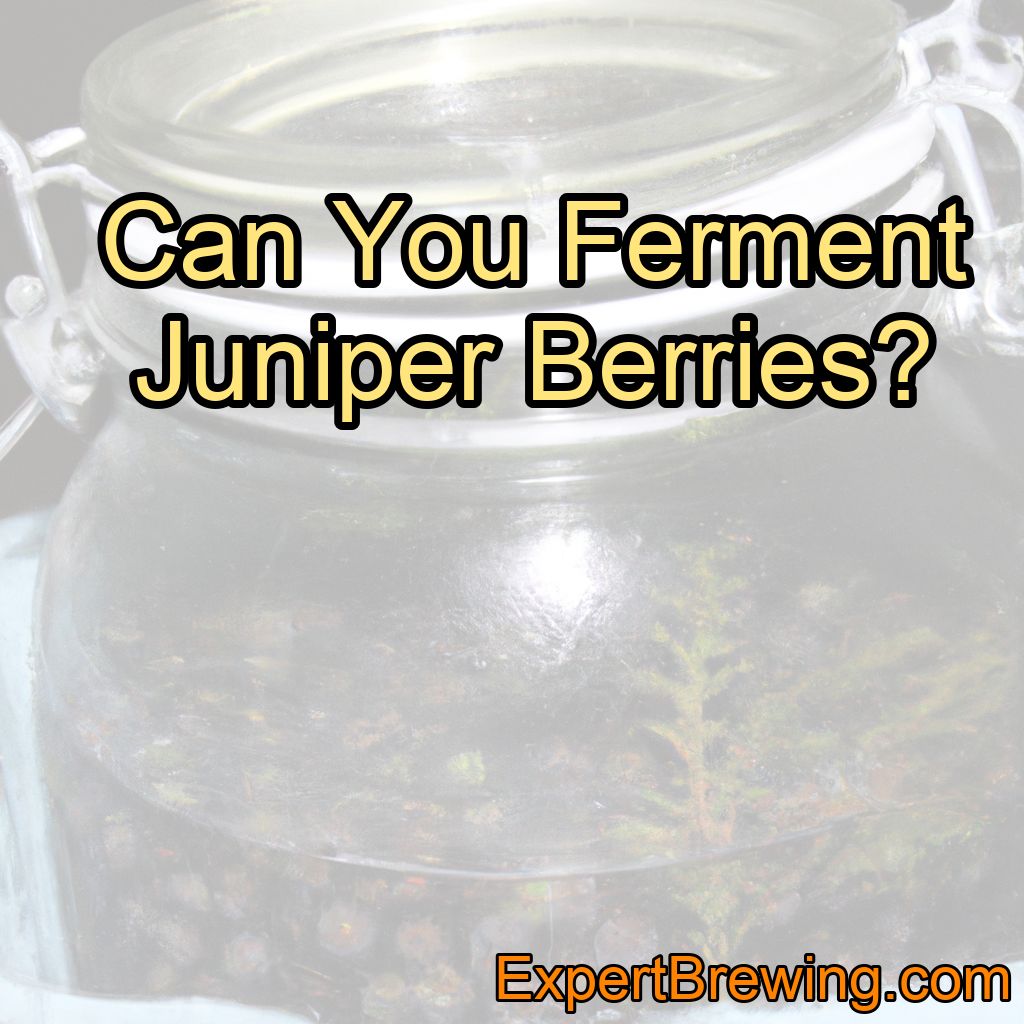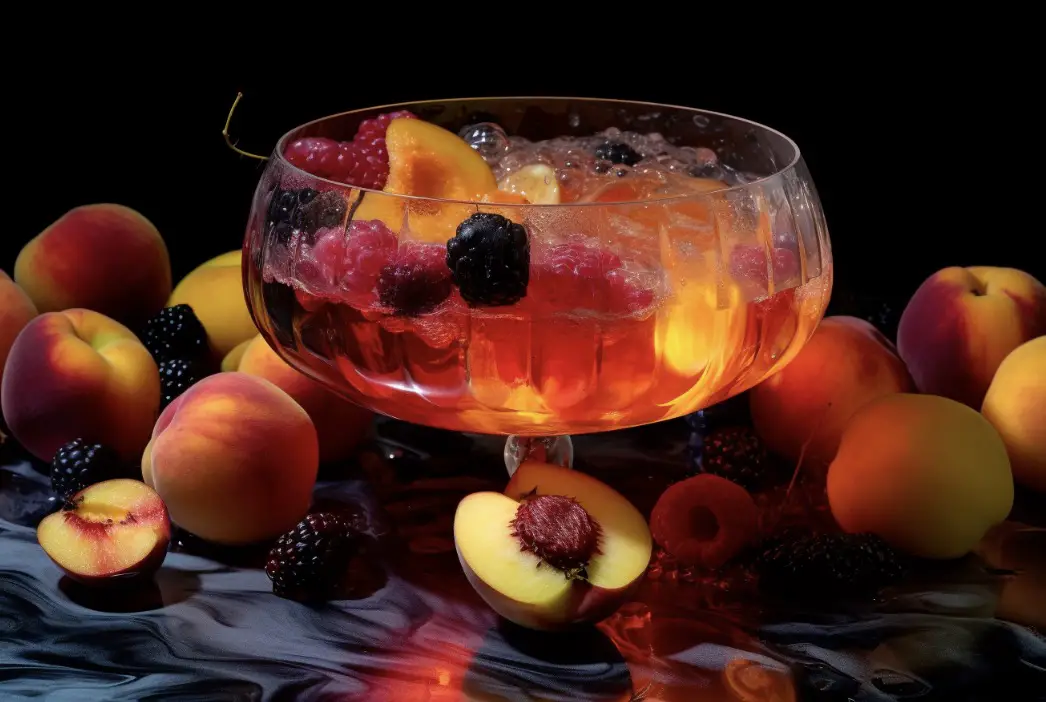For centuries, juniper berries have been a staple in culinary and medicinal applications. Their unique flavor profile and aroma have made them a popular choice for creating various concoctions. But can you ferment juniper berries?
Yes, you can ferment juniper berries. They have enough sugar content and nutrients to support fermentation, and the process can produce a unique and delicious beverage with a distinct juniper flavor.
Let’s dive into this question and uncover the secrets of this small but mighty berry.
What Are Juniper Berries?
Juniper berries are not true berries but are actually the female seed cones of juniper plants, which are small, evergreen shrubs in the cypress family. The “berries” are typically blue or dark purple and have a unique, slightly piney flavor with a hint of citrus and pepper.
There are many different species of juniper plants, but the most commonly used for culinary purposes is Juniperus communis. This species grows across Europe, Asia, and North America and is known for its distinct flavor and aroma.
The History of Juniper Berries and Their Use In Alcoholic Drinks!
Juniper berries have been utilized by various cultures throughout history. The ancient Romans and Greeks used juniper berries as a spice and as a natural remedy for ailments like indigestion and inflammation. In medieval times, juniper was believed to ward off evil spirits, and the berries were often hung in homes for protection.
Today, juniper berries are famous for their use in gin production. They provide the key flavor that defines this popular spirit. Juniper berries are also used in cooking, particularly in Scandinavian and Northern European cuisine, where they are often paired with game meats, like venison and elk.
So it is clear that juniper berries have been used for centuries in various culinary applications, including the production of fermented beverages. They are particularly renowned for their role in the production of gin, a popular distilled spirit.
Let’s explore how juniper berries can be used in fermentation and alcoholic beverages.
- Gin Production: Juniper berries are the defining ingredient in gin. They impart the distinctive piney and citrusy flavors that are characteristic of this beloved spirit. To make gin, juniper berries are typically combined with neutral spirits (such as vodka) and a variety of botanicals, including herbs, spices, and other fruits. The berries are macerated or distilled with the base spirit, allowing their flavors to infuse into the liquid. This infusion process creates the foundation for gin’s unique taste.
- Brewing Beer: Juniper berries can also be utilized in brewing beer to add complexity and a hint of earthy, herbal flavor. They are often used as a substitute for or in conjunction with hops, the traditional bittering agent in beer. Juniper berries contribute a slightly resinous and spicy character to the brew. They can be added during the boiling stage, like hops, or during the fermentation process to extract their flavors.
- Mead Making: Mead, an alcoholic beverage made from fermenting honey, can benefit from the addition of juniper berries. The berries provide a botanical note that complements the sweetness of the honey. Juniper berries can be added to the primary fermentation vessel, allowing their flavors to blend with the honey during the fermentation process. Alternatively, they can be used in a secondary fermentation or as a part of the flavoring infusion after fermentation.
- Fruit Wines: Juniper berries can also be used in the production of fruit wines, enhancing the overall flavor profile. When making wines from fruits like apples, pears, or cherries, juniper berries can be added to the fermentation vessel to impart their aromatic characteristics. They can either be used as a primary ingredient or as a complementary flavoring element, depending on the desired taste.
- Liqueur Creation: Juniper berries can be employed in the production of liqueurs, which are sweetened spirits infused with various flavors. For example, juniper berries can be used to create a homemade liqueur by steeping them in a base spirit, such as vodka or brandy, along with sugar or simple syrup. This infusion process allows the berries to release their flavors, resulting in a unique and flavorful liqueur.
It is important to note that while juniper berries can be a delightful addition to fermentation and alcoholic beverages, it is crucial to use them in moderation.
Their flavors can be potent, and overusing them may lead to an overpowering taste. As with any ingredient, experimentation and careful consideration of flavors and proportions are key to achieving the desired results.
In conclusion, juniper berries play a significant role in the world of fermentation and alcoholic beverages. Whether it’s in gin production, beer brewing, mead making, fruit wines, or liqueur creation, these berries contribute their distinct aroma and flavor, adding complexity and depth to the final product.
The Science of Fermentation
Fermentation is a natural process in which microorganisms, like yeast and bacteria, break down sugars and other compounds to produce alcohol, gases, and other byproducts.
This process has been used for thousands of years to create various food and beverage products, like beer, wine, bread, and yogurt.
In the case of fermenting juniper berries, the sugars present in the berries are consumed by yeast, which then produces alcohol and carbon dioxide. The resulting product is a unique, fermented beverage with a distinct juniper flavor.
Preparing Juniper Berries for Fermentation
Before fermenting juniper berries, it’s essential to properly prepare them. This will help ensure a successful fermentation process and a delicious final product. Here are some steps to follow when preparing juniper berries for fermentation:
1. Choose fresh, ripe juniper berries. Look for berries that are dark blue or purple in color and have a slightly soft texture.
2. Clean the berries thoroughly. Rinse them under cold water and remove any dirt, debris, or insects.
3. Crush or mash the berries to release their juices. This can be done by hand or with a potato masher or food mill.
4. Add sugar and water to the crushed berries. This will provide additional nutrients for the yeast and help to create a better-tasting final product.
Choosing the Right Yeast for Fermenting Juniper Berries
Selecting the appropriate yeast strain is crucial for a successful fermentation process. Some yeast strains are better suited for fermenting fruits, while others are more commonly used for fermenting grains or other ingredients. For fermenting juniper berries, it’s best to choose a yeast strain specifically designed for fruit fermentation, like a wine yeast or a champagne yeast.
These yeast strains are well-suited for fermenting the sugars found in juniper berries and will help produce a clean, fruity flavor profile in the final product.
The Fermentation Process
Once the juniper berries have been prepared and the yeast has been selected, it’s time to begin the fermentation process. Here are the basic steps to fermenting juniper berries:
1. Combine the crushed juniper berries, sugar, and water in a fermentation vessel, like a glass carboy or a food-grade plastic bucket.
2. Add the yeast to the mixture, following the instructions on the yeast package.
3. Seal the fermentation vessel with an airlock to prevent outside contaminants from entering the mixture.
4. Store the fermentation vessel in a cool, dark location with a consistent temperature, ideally between 60-70°F (15-21°C).
5. Allow the mixture to ferment for 2-4 weeks, or until the fermentation process is complete.
Monitoring and Adjusting the Fermentation
During the fermentation process, it’s essential to monitor the progress and make any necessary adjustments to ensure a successful final product. This can include:
1. Checking the specific gravity of the mixture using a hydrometer. This will help determine the alcohol content and provide information on the progress of the fermentation.
2. Tasting the mixture periodically to assess the flavor development. This can help determine if any adjustments need to be made, such as adding more sugar or adjusting the acidity.
3. Monitoring the temperature and adjusting as needed to maintain a consistent fermentation environment.
Bottling and Aging the Fermented Juniper Berry Beverage
Once the fermentation process is complete, it’s time to bottle and age the fermented juniper berry beverage. This can be done using traditional wine bottles and corks or other suitable containers.
After bottling, it’s essential to age the beverage for an appropriate amount of time to allow the flavors to develop and mature. This can range from several months to a year or more, depending on personal taste preferences and the specific characteristics of the fermented juniper berry beverage.
Conclusion: The Delicious World of Fermented Juniper Berries
In conclusion, juniper berries can indeed be fermented, resulting in a unique and flavorful beverage. Here are ten facts about fermenting juniper berries:
1. Juniper berries can be fermented due to their sugar content and nutrients.
2. Juniper berries have been used throughout history for culinary and medicinal purposes.
3. They are not true berries but are actually seed cones.
4. The most commonly used species for culinary purposes is Juniperus communis.
5. Fermentation is a natural process that involves microorganisms breaking down sugars.
6. Proper preparation of juniper berries is crucial for successful fermentation.
7. Selecting a yeast strain specifically designed for fruit fermentation is essential.
8. The fermentation process typically takes 2-4 weeks.
9. Monitoring and adjusting the fermentation is necessary for a successful final product.
10. The fermented juniper berry beverage should be bottled and aged for several months to a year or more.
FAQs
Can you make yeast from juniper berries?
No, yeast cannot be made from juniper berries. Yeast is a type of fungus that naturally occurs in the environment and can be cultivated from sources such as grains, fruits, and even the air. Juniper berries do not contain yeast and cannot be used to create it.
What are the ingredients in juniper berry?
Juniper berries contain various compounds including essential oils, terpenes, flavonoids, and antioxidants. The primary active compound in juniper berries is called alpha-pinene, which gives it its distinct aroma and flavor. Other compounds found in juniper berries include limonene, myrcene, and beta-pinene.
How do you get yeast from juniper berries?
Yeast can be obtained from juniper berries by crushing the berries and creating a mash, then allowing the mash to ferment naturally. The yeast present on the juniper berries will begin to multiply and ferment the sugars in the mash, creating alcohol.
What does juniper do for the body?
Juniper has various potential health benefits, including acting as a diuretic, reducing inflammation, improving digestion, and providing antioxidant and antimicrobial effects. However, it is important to note that juniper should be used in moderation and under the guidance of a healthcare professional, as it may have potential side effects and interactions with certain medications.
Do juniper berries have yeast?
No, juniper berries do not naturally contain yeast. There may be yeast cells from the air or surroundings stuck on the outside of juniper berries of not cleaned properly though. Yeast is a type of fungus that is typically found in the environment or added to food during fermentation.
What is the best way to preserve juniper berries?
The best way to preserve juniper berries is to store them in an airtight container in a cool, dry place away from direct sunlight. They can also be frozen for long-term storage.




